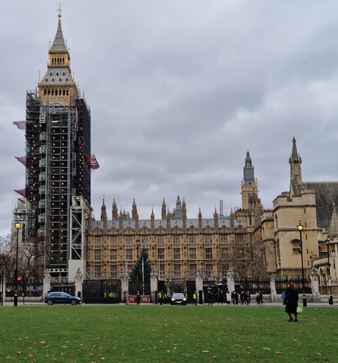If there’s a pecking order in the Home Office of laws to go towards the statute book, the Protect Duty appears to be behind the likes of extra powers for police against protesters; and people-smugglers across the Channel, judging by the Queen’s Speech 2022, writes Mark Rowe.
The speech – given by Prince Charles – did not include the Protect Duty, a proposed legal responsibility on all ‘publicly accessible locations’ as trailed by the Home Office for a couple of years and subject of a public consultation. A draft Protect Duty Bill was part of much more detailed background notes. That laid out the Duty would include a ‘new requirements framework’ to require those in control of public locations and venues to consider the threat from terrorism and implement appropriate and proportionate mitigation measures; and (more crucial in practice) ‘an inspection and enforcement regime’, to ‘educate, advise, and ensure compliance’. The document gave no further details about what body might set up such a regime (part of the police or local government? the Health and Safety Executive? the SIA? some new body altogether?).
To read the Queen’s Speech visit https://www.gov.uk/government/speeches/queens-speech-2022.
It appears that more definite than the Duty are what did get touched on in the Queen’s Speech: a Public Order Bill, to ‘give the police the powers they need to prevent a minority of protestors from using guerrilla tactics that cause misery to the hardworking public, disrupting businesses’, according to the background notes. Also more definite is a somewhat-delayed Economic Crime and Corporate Transparency Bill, against ‘illicit finance’.
Among specifics about that law against fraud and money-laundering, identity verification is proposed, for ‘people who manage, own and control companies and other UK registered entities, to ‘improve the accuracy of Companies House data; and Companies House will have ‘more effective investigation and enforcement powers’ and ‘better cross-checking of data’ with others in the public and private sectors.
As on other occasions, ‘safer streets’ was mentioned as a priority by Prime Minister Boris Johnson. Hence a draft Victims Bill to ‘strengthen rights for victims by placing the Victims’ Code on a statutory footing, restore victims’ confidence that their voices will be properly heard and that perpetrators will be brought to justice’, also not explicitly mentioned in the Queen’s Speech but only in the background notes.
Talking of safer streets, that was quoted in the background notes on a Public Order Bill, aimed explicitly at ‘preventing a minority of protestors from using guerrilla tactics that cause misery to the hard-working public’ and disrupt businesses – the HS2 rail project and the targets of Extinction Rebellion climate change protesters (XR) in London being singled out in the notes. Proposed are ‘Serious Disruption Prevention Orders’, described as ‘a new preventative court order targeting protestors who are determined to repeatedly inflict disruption on the public’. A breach of such an order will be a criminal offence.
As a sign of how politically important it is, and yet how difficult, to counter such protest, new powers were part of the Police, Crime, Sentencing and Courts Act 2022, which has only just passed, and which proved controversial in the House of Lords and to human rights campaigners such as Liberty.
A Modern Slavery Bill is proposed, to update the 2015 law, to bring in a requirement that large organisations that already have to publish an annual modern slavery statement, place their statements on a government-run registry (such a registry was launched by the Government last year).
As for cyber, a Product Security and Telecommunications Infrastructure Bill would require security standards for smart devices such as mobiles phones and televisions; and those product security requirements, which protect devices from emerging threats, will be regularly updated. Manufacturers will also be required to have a point of contact for reporting software vulnerabilities to the market.
And something set out in the Queen’s Speech was that the UK’s ‘data protection regime will be reformed’. It dates from the Data Protection Act 2018, which came in before Brexit and is in line with the European Union-wide GDPR regulations. The background notes – once you go past the guff of the new law being ‘world class’ and a ‘gold standard’ – detailed that it would ‘modernise’ the data protection regulator the ICO, make for ‘a clearer regulatory environment for personal data use’ and reduce ‘burdens’ on businesses. By contrast, the 2018 Act and GDPR are lambasted as ‘highly complex and prescriptive pieces of legislation’.










